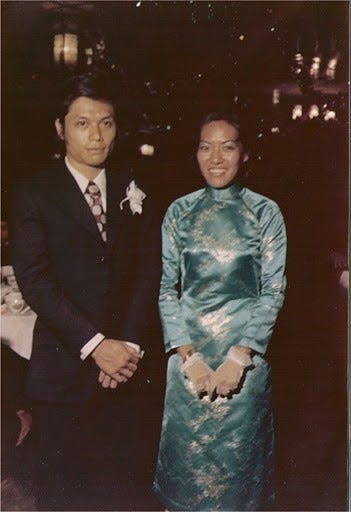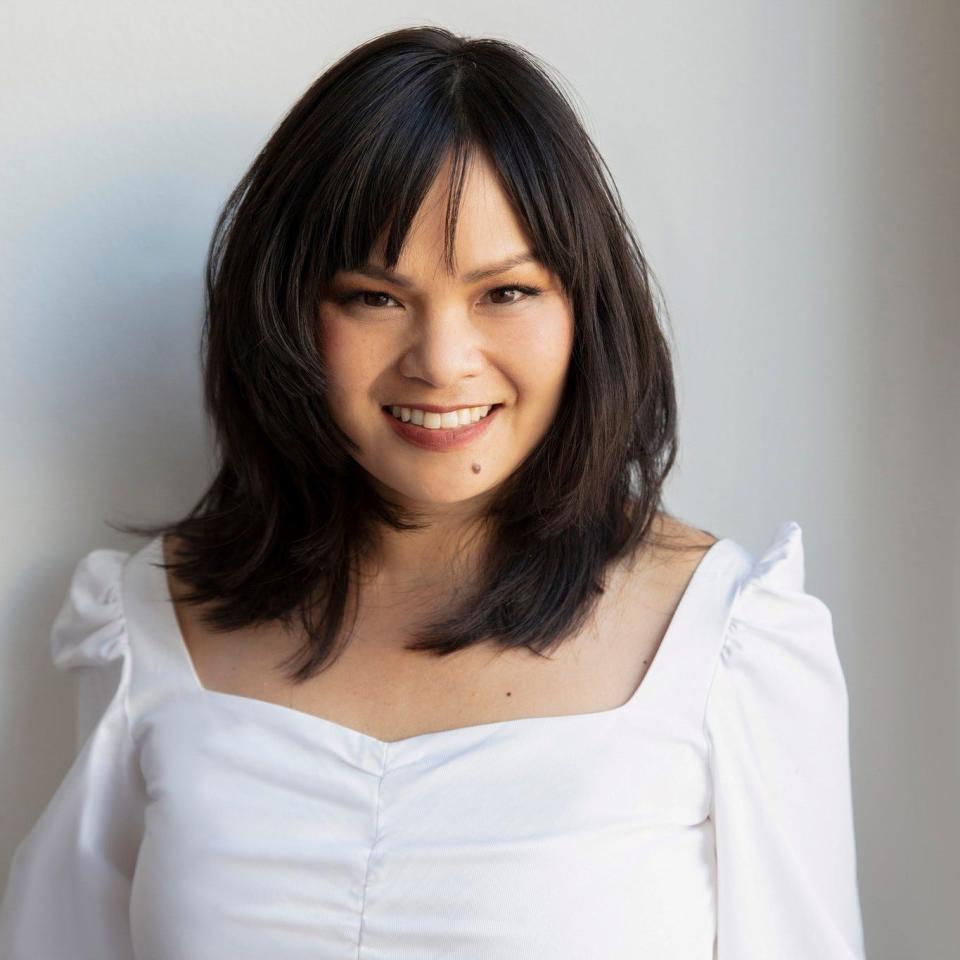Half a century later, the ghost of South Vietnam still haunts my family
My mother passed away when I was 14 – a defining moment in my life that shaped the trajectory of the woman I've become. After I graduated college, I attempted to piece together her story by visiting places she had lived and grew up, including Vietnam and Cambodia. I also spent time with her family members in France, Switzerland and Louisiana, and became acquainted with her younger brother in Saigon.
Because I never heard stories directly from her, I sought them out to paint a vivid picture of the woman whom I knew in only one role – my mother, Evelyne Yubonn Gonoux. I discovered through family members that my mother was "vivacious" and "alive"; an avid Ping-Pong player in Cambodia, where she was born and raised as a third-generation Cambodian of Vietnamese descent; and a medical doctor in Vietnam. These descriptions felt like such a stark contrast to my mother who didn’t work or drive, and whose life felt defined by the meals she prepared for us in small towns where I was raised in Tennessee, Illinois and Indiana.
Throughout my global quest to find her, however, I overlooked another family member – my father, Nghia Vo. Nearly 50 years later, the memory of South Vietnam and the lasting trauma of its fall to North Vietnam's communist regime still haunts my family.
Opinions in your inbox: Get exclusive access to our columnists and the best of our columns
Fall of Saigon, April 30, 1975
After finishing medical school, my father was drafted into the South Vietnamese army as a physician. In April 1975, he was transferred to Phu Quoc, an island off the southwestern coast of Vietnam. When Saigon fell to the communists that April 30, my father boarded a boat that was about to set sail in search of freedom.

Meanwhile, my mother remained in Saigon with their first son, a toddler. After the war ended, she worked at the French Grall Hospital, earning enough money to secure passage out of Vietnam in 1976. She eventually reunited with my father in the United States.
Upon her arrival, my father noticed that although she remained the same person, something about her spirit had changed. Their son had passed away from hemorrhagic fever, and perhaps the combined weight of his loss and the war had taken a toll on her soul.
'Homeless among the clouds': My journey from movie star to faceless refugee
Two wars showed me who I am: When did I, a daughter of Vietnam, become an American?
After graduating from the University of North Carolina at Chapel Hill, I worked for a pharmaceutical company for a year, but there was a deep yearning within me to know more about my family's history and, in particular, my mother's story. I secured an internship in Vietnam, primarily to delve deeper into my roots.
While living and working in Saigon in my early 20s, I saw glimpses of my mother in the Vietnamese women gathered chatting over "cafe sua da" in crowded coffee shops in District 1. I’d watch them drive away on their motorbikes, somehow navigating the vehicles with heels and wearing gloves to protect their skin from the scorching Saigon sun, and I wondered whether my mother would have been happier in Vietnam? Would her soul have felt more at ease?
A lifeline to my father
Now in his mid-70s, my father, Nghia Vo, was always a distant, quiet man, focused on building his medical career and working on his personal projects.
As a child, I remember he slept in a separate room, while my mother, my sister and I shared another room. My sister and I never communicated with him directly, relying on my mother to ask him questions for us. To this day, I'm unsure whether the no's we received as children were truly his words, or whether she put them in his mouth. When she passed away, we not only lost her but also a lifeline to my father.

I eventually settled in San Francisco in my 30s, on the opposite coast from my father, who had remarried another Vietnamese woman a few years after my mother passed away on April 26, 1994. They divorced, and he moved from Southern Indiana (his home for 15 years) to Northern Virginia, where he started a new career as a scientific research officer.
Being closer to a Vietnamese community served my father well. He began writing and researching Vietnamese history, publishing books and anthologies, and founding a nonprofit organization to help document Vietnamese American culture as a way for future generations to learn about the people of South Vietnam, a country that no longer exists.
Soldiers without a country: We're finally honoring South Vietnamese who fought with us
'You're my Kim': How I landed a Hollywood movie and gained a 'Heaven and Earth' family
His passion for researching Vietnam and sharing his love for South Vietnam, in particular, brought him to life. I eventually realized that despite facing numerous losses in his life – his son, my mother, the divorce from his second wife – the greatest love and loss in my father's life was South Vietnam.
'Vietnam is a country that has always been fighting itself'
Last year, he invited me to attend a Texas Tech University conference in Orange, California, focused on Vietnamese history. I accepted, knowing that as my father ages, our time together is limited. In the back of my mind, I regretted all the times he asked for my help with his nonprofit and I declined.
At the conference, my father was scheduled to present on two panels. I was nervous, having only heard my father speak in public a few times – at my mother’s funeral and at the 25th reunion of his medical school class in Northern Virginia. I was surprised to see that my father had befriended other attendees, many of them U.S. veterans, some of whom had attended his conference previously. The common thread that united these men with vastly different lives was Vietnam and their desire to unpack the past, to unravel the war.
Missing in action: 50 years later, peace treaty that was supposed to end Vietnam War is still MIA
'Dust Child': She searched for a father she'd never met. Then, after 52 years, they found each other.
When my father spoke on one panel about the Paris Peace Talks, I was taken aback. I hadn't expected my quiet, reserved father to speak so passionately. He transformed into a man who spoke with deep reverence and love for the motherland.
The conference’s keynote speaker, former Ambassador John Negroponte, who was a member of the U.S. delegation to the Paris negotiations in 1973, approached him afterward and thanked him for his presentation. “You were a medical doctor,” he said, “how do you know so much about the history of Vietnam?”
My father responded, “Well, Vietnam is a country that has always been fighting itself. I had to understand the reason why.”
It dawned on me at that moment that for my entire life, I never saw my father clearly, identifying him only as a quiet man living in the shadow of my mother’s memory.
Opinion alerts: Get columns from your favorite columnists + expert analysis on top issues, delivered straight to your device through the USA TODAY app. Don't have the app? Download it for free from your app store.
The roles of men and women in the Vietnam War – people who are now grandfathers, grandmothers, fathers and mothers of younger generations – differed, and the lingering trauma passed from one generation to the next has its distinct tones. And perhaps just as I saw my mother in the Saigonese women chatting over their ice coffees, maybe for my father, while it is difficult for him to express this directly, his most vivid memories are also of Vietnam.
Perhaps, regardless of how many years Vietnamese people live on foreign terrain, even if it is the majority of their lives, they will always feel most at home in Vietnam. And maybe for many, just like my father, their greatest loss will always be South Vietnam.
Christina Vo, is the author of the newly published "The Veil Between Two Worlds: A Memoir of Silence, Loss, and Finding Home." Follow her on Instagram: @stina_vo or find her at christinavo.com
You can read diverse opinions from our Board of Contributors and other writers on the Opinion front page, on Twitter @usatodayopinion and in our daily Opinion newsletter. To respond to a column, submit a comment to letters@usatoday.com.
This article originally appeared on USA TODAY: Fall of Saigon anniversary: Loss of South Vietnam haunts my family

